
March 18-20 Global Days of
Action Against War
• Defending Rights Builds Resistance to War!
Katrina Survivors and
Veterans March
• Bring Troops and Survivors Home Now
Katrina Survivors and Veterans March
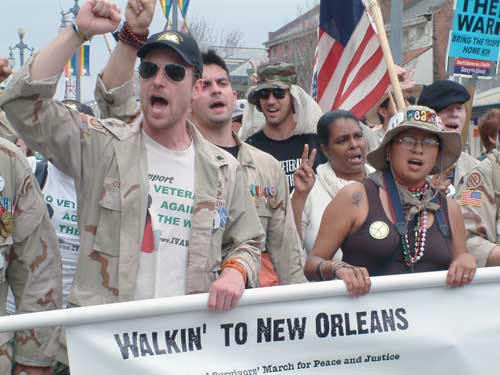
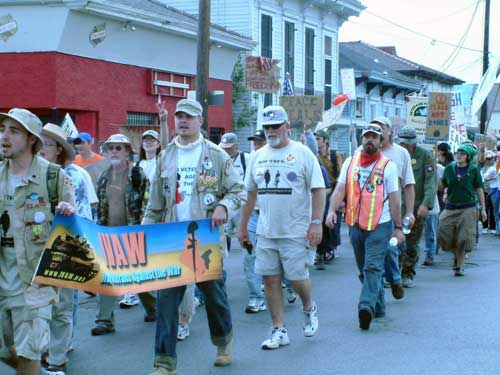
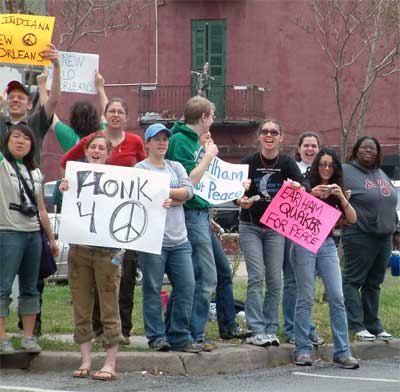
![]()
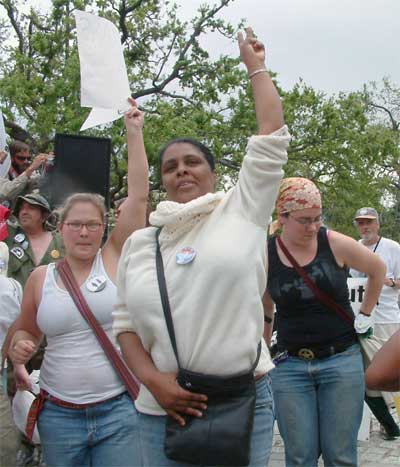
Greetings for the Marchers as they arrive in New Orleans
March 18-20 Global Days of Action Against War
Defending Rights Builds Resistance to War!
Around the world on March 18-20, the peoples united to build up their resistance to war and reaction by firmly defending rights. The right of the Iraqi people to be and to determine their own affairs was uppermost in many actions, as peoples stood against U.S. imperialism and its occupation of Iraq. "Bush, World's No.1 terrorist," was a common chant and banner.
The peoples also stood against the many attacks on rights of the U.S. war of terrorism with widespread opposition to torture and imprisonment. As one speaker in Sweden, representing world sentiment said, "We do not need Abu Ghraib democracy or Guantánamo Bay freedom." Opposition to U.S. threats against Iran, Cuba, Venezuela and the Democratic Peoples Republic of Korea were also seen in banners and signs worldwide. People also stood against the broad attacks on Arabs and Muslims, who were prominent in the many actions.
Demonstrations took place in Asia, including Pakistan, Bangladesh, Korea, Japan, and the Philippines; across Europe, including Britain, Denmark, Greece, Spain, Poland and Turkey; as well as Australia, and in the Americas, including Canada, Mexico, Puerto Rico, Nicaragua, Venezuela and many other countries.
In the U.S. hundreds of actions in all fifty states were organized. A main feature of the more than 600 actions was the local organizing efforts to strengthen common action, in the country and internationally, and to broaden efforts to inform and involve new forces. Women organized a world petition against war and gathered well over 100,000 signatures in a few months. Iraqi women joined American activists in touring the United States. Iraqi vets and war resisters, on the march from Mobile to New Orleans, emphasized their support for the Iraqi people and the Iraqi resistance to U.S. occupation. The spirit of the people together fighting on the basis of principle, standing for rights and organizing to defend humanity was strongly felt, in action after action, from coast to coast.
The efforts to inform more people and involve them in common activity was seen in the many house meetings organized, the weekly vigils, the activists going into the high schools to do counter-recruiting work, and more. Targeting of military recruiting centers and organizing by youth against recruiters was another example of the strengthening of the resistance.
Among the hundreds of actions in cities and towns large and small were the many in California, those in Portland, Eugene and Olympia, Oregon; Reno, Nevada; Salt Lake City, Utah; Boise, Idaho; Burlington, Iowa; Las Cruces and Santa Fe, New Mexico; Minneapolis, Minnesota; Chicago, Illinois; Indianapolis, Trafalgar and Terre Haute, Indiana; Detroit, Michigan; Pittsburgh, Pennsylvania; Fayetteville, North Carolina; Calhoun, West Virginia; Atlanta, Georgia; West Palm Beach, Florida; Washington, DC; Trenton, New Jersey; New York City; Boston, Massachusetts; Concord, New Hampshire and many, many more.
Two of the largest actions took place in Portland and Chicago. Portland demonstrators filled the streets, chanting and drumming and carrying homemade signs protesting the war and demanding that Bush be impeached. In Chicago, the anti-war action followed a massive demonstration a week earlier to defend the rights of immigrants. The anti-war activists built on this and organized a "Festival of Rights." More than a dozen feeder marches gave expression to the work and demands of various forces, with everyone rallying in Union Square and then later joining in a mass action down Michigan Avenue. The march represented a gain by activists against police efforts in Chicago to block downtown marches. As well, in Champaign/Urbana, south of Chicago, the City Council passed a resolution to bring the U.S. military home and end the occupation.
In Boise, Idaho, protesters handed out 500 "receipts" from the Department of Defense, representing the $225.6 billion in public funds already spent on the war. They formed a human line from the offices of two Idaho Congresspeople to the Idaho Statehouse and passed "dollars" down the line into the Iraq War trashcan. Protesters demanded funding for the needs of the Iraqi people and for Americans.
In Las Cruces, New Mexico, protesters made banners and stood together at a busy intersection. Most of the people driving by honked and waved in support.
In Washington, DC demonstrators picketed Vice President Dick Cheney's home. Hundreds also marched to the Pentagon. Protestors carried a coffin, symbolizing the deaths of civilians and soldiers, in Iraq, Afghanistan and elsewhere, to be delivered to the Pentagon. Fifty-one people engaged in mass civil disobedience and climbed the Pentagon fence in an effort to deliver the coffin to Defense Secretary Donald Rumsfeld. All were charged with "failure to obey a lawful order," and then released. Participants emphasized their plans to step up work in local communities surrounding Washington and to continue holding mass actions.
Marchers in the action from Tijuana, Mexico to San Francisco, highlighting the resistance of Latinos, are continuing their march. The action includes Iraq war resisters and military families, marching 241 miles up the coast. The march will protest at Camp Pendleton and also go through Escondito, La Paz, Watsonville, Salinas and other communities with large populations of Latino farmworkers. Like many other actions, participants are taking their stand to defend the rights of the Iraqi people and those of Americans and the world's peoples in demanding an end to imperialist war. They are fighting for the rights of Latinos, immigrants, workers, the rights of all, standing as one with humanity in the struggle for another world.

![]()
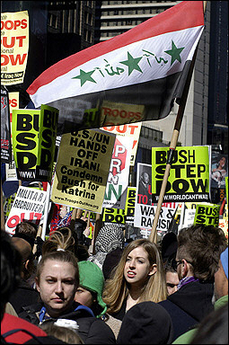
West Palm Beach, Florida; New York City

![]()
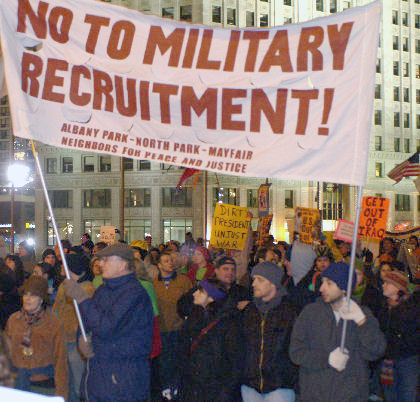
Washington, DC; Chicago, Illinois

Minneapolis, Minnesota

![]()
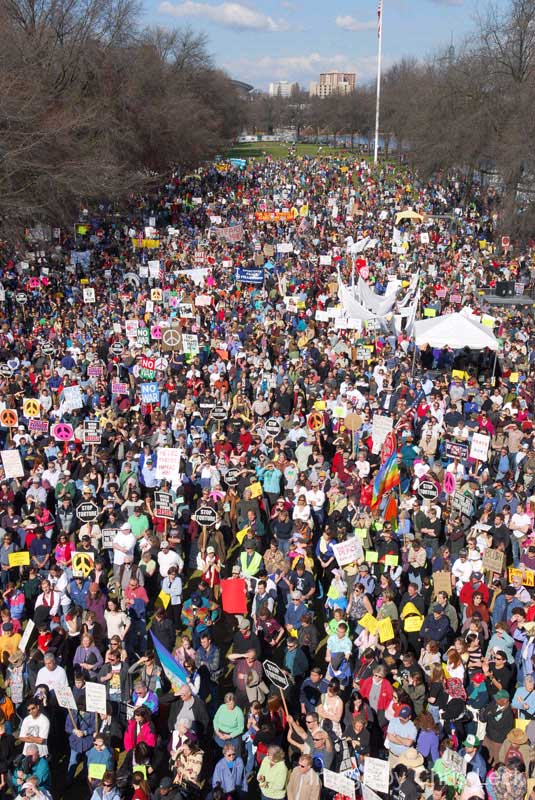
San Diego, California; Portland, Oregon

![]()
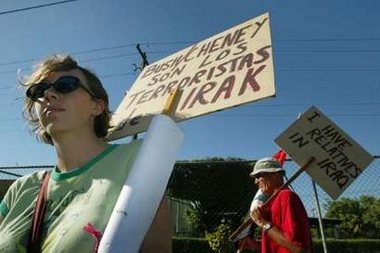
Toronto, Canada; Managua, Nicaragua

![]()

London, England; Madrid, Spain
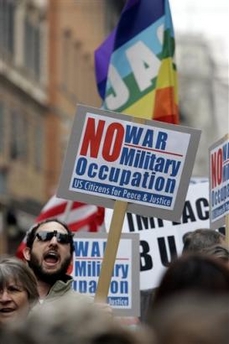
![]()
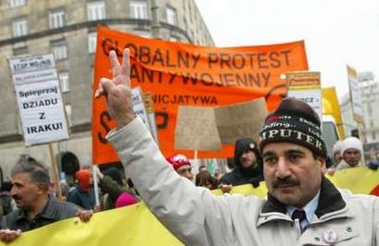
Rome, Italy; Warsaw, Poland
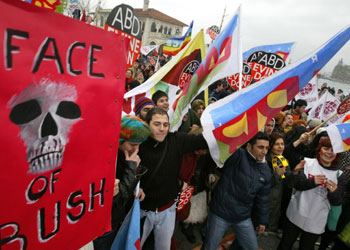
![]()
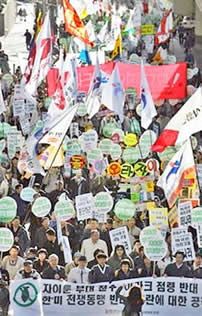
Istanbul, Turkey; Seoul, Korea
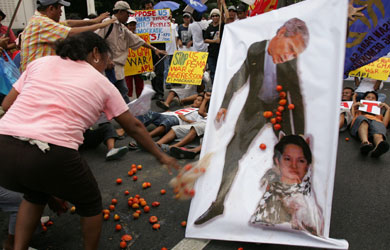
![]()

Manila, Philippines; Kuala Lumpur, Malaysia
[TOP]
Katrina Survivors and Veterans March
Bring Troops and Survivors Home Now
In a spirited march from Mobile, Alabama to New Orleans, Katrina survivors, Iraq and Vietnam veterans and war resisters, military families and many youth gave expression to the demand of peoples everywhere: Bring the U.S. Troops and Survivors Home Now! The march emphasized the failure of the U.S. state in the aftermath of Katrina, and the injustice of the Iraqi occupation. It also brought to the fore the efforts by the people themselves to strengthen their resistance and organize themselves to rebuild New Orleans and the Gulf Coast.
Katrina survivors spoke to their repeated battles with the Federal Emergency Management Agency (FEMA) and various local and state officials as they demanded housing and basic necessities like -electricity and gas. At every level, now seven months later, the government continues to systematically organize to block the return of survivors. Vets and survivors together were adamant that the people will go forward with rebuilding and with fighting to come home. All are defending their rights to rebuild, to compensation, to healthcare and other assistance.
The many vets marching spoke to their determination to strengthen resistance to war in the military. They also commented that the devastated towns of the Gulf looked like the war zone in Iraq, with both areas destroyed and left in ruins.
The sense of unity between vets and survivors ran deep, both among marchers and with those along the route. People opened their arms, homes and churches to the marchers. In Alabama, Mississippi, and Louisiana, the marchers were warmly welcomed, with honking cars, people coming out to greet them, places to stay and food to eat - this coming from people who have lost everything. The experience of all made clear that it is the people, relying on their own efforts and working together who are solving problems. No one is waiting on the government for solutions.
As the marchers came into New Orleans, they were warmly greeted by survivors, youth and activists from the region. They rallied in Congo Square, long a place of resistance and culture. Taking up this spirit of Congo Square, participants began with a rousing dance together to the 1960s song against U.S. wars, with its chorus, "War, what is it good for? Absolutely nothing!" Everyone, vets and survivors, youth and seniors, African Americans, whites, Latinos, Natives, together gave expression to their joy of being together and to their determination to win change.
Speakers representing survivors and their organizations from the Gulf Coast, as well as local organizers and the various organizations of veteran and military families spoke about their work and emphasized the need to keep up organized resistance and common work together. They gave examples of the various efforts already taking place, such as vets sending in food and building supplies for survivors. Local organizers, such as those from Common Ground and the People's Hurricane Relief Fund talked about their efforts to provide healthcare and housing and the on-going work to rebuild, especially in the 9th Ward, the area hardest hit.
As the week long march drew to a close, people expressed how inspired they were by the social relations built up, not only among the various groups organizing the march, but also with the churches and groups and individuals along the way. People commented about the vitality that existed as a result of the organizing efforts and the importance of building on the accomplishments. Vets and survivors made clear, this united action is one of many more to come. Together participants saluted each other and began making plans to insure that New Orleans and the Gulf Coast are rebuilt by and for the people.
[TOP]